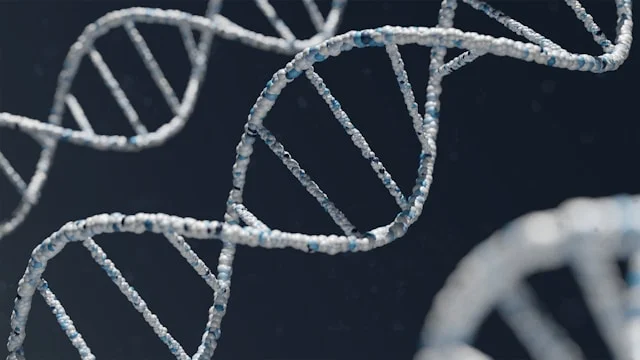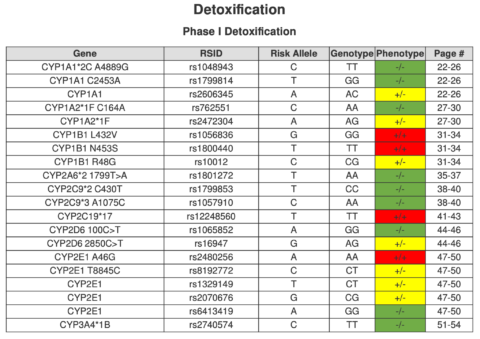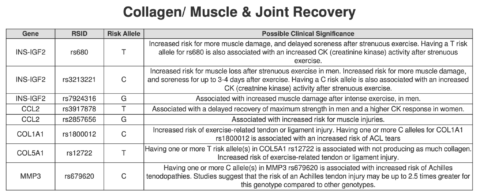
Overview
- Products: Static PDF genetic report and companion book.
- Cost: $29.99 per report, with the book sold separately.
- Reports: Covers ~300 genetic variants related to detoxification, with genotype results linked to book page numbers.
- Raw data access: Accepts raw DNA files from services like 23andMe, AncestryDNA, and SelfDecode.
- Privacy: No clear data handling or privacy policy publicly disclosed.
- Alternatives: More comprehensive platforms like SelfDecode and PromicsEdge offer dynamic reports, risk scoring, and actionable recommendations.
Genetic Detoxification Pros and Cons
Pros
- Accessible to users with raw data from multiple testing services
- Affordable, one-time cost
Cons
- Covers only approximately 300 genetic variants
- Report is static and lacks interactive features or automated analysis
- Not designed for clinicians or those needing scalable insights
- Lacks polygenic risk scoring or prioritization of high-impact results
- No integration with lab data, lifestyle factors, or gene-gene interactions
- No personalized or dynamic health recommendations
About Genetic Detoxification
Genetic Detoxification was founded by Dr. Christy Sutton, a chiropractor with a background in microbiology, anatomy, and wellness. The company centers around her book Genetic Testing: Defining Your Path to a Personalized Health Plan and aims to help individuals use their raw DNA data to gain health insights.
Based in Dallas, Texas, Genetic Detoxification reflects Dr. Sutton’s personal mission to prevent chronic disease through education and personalized health strategies informed by genetics.
Review of Genetic Detoxification Products & Services
Genetic Detoxification offers basic genetic reporting designed to complement the book Genetic Testing: Defining Your Path to a Personalized Health Plan by Dr. Christy Sutton.
Users upload raw DNA data from services like 23andMe or SelfDecode to generate a report showing their genotypes for the genes covered in the book. The service is positioned as a tool for readers to explore how their genetics may relate to detoxification and broader health topics, with interpretation left largely in the hands of the user.
Review of Genetic Detoxification Report
The Genetic Detoxification report provides a basic overview of a user’s genotype for a limited number of genes discussed in the accompanying book Genetic Testing: Defining Your Path to a Personalized Health Plan.
It presents results in a downloadable PDF format, where each gene includes the user’s SNPs and links to a specific page number in the book for further context and recommendations.
The book covers approximately 300 genetic variants, which are referenced throughout the report to guide users toward relevant chapters for more in-depth explanations.
Unlike more comprehensive platforms that analyze thousands of SNPs and offer dynamic health scores, this report focuses on a small, curated list of detox-related genes and does not offer polygenic analysis or integration with labs or lifestyle data.
For genes not covered in the book, the report includes an appendix with limited summaries about the gene’s function and potential health impacts, though these are more general and not explored in depth.
Each gene result includes a basic explanation and some interpretation of possible implications, but there are no personalized recommendations or prioritization features. The report functions more as a static reference guide and is best understood when used side-by-side with the author’s book.
Overall, the Genetic Detoxification report is most suitable for users who are following the companion book closely and are interested in a self-guided exploration of detox-related genetics. For users or practitioners seeking a standalone, interactive, or clinically actionable solution, the report may feel limited in both personalization and depth.
SNPs vs PRS: Why It Matters
Genetic Detoxification’s report is built on a single-SNP approach, showing users whether or not they carry specific variants linked to detox pathways. While this can be interesting, single-SNP analysis is now considered outdated in the field of genetics. A single variant on its own often has little predictive value, sometimes no more accurate than chance, because most traits and conditions are influenced by hundreds or thousands of variants working together.
This is where polygenic risk scoring (PRS) offers a major advancement. PRS combines the impact of many variants across the genome to generate a more accurate and meaningful measure of risk. When adjusted for ancestry, PRS models become even more reliable, providing insights that reflect real-world genetic diversity.
By comparison, Genetic Detoxification’s static report lacks the depth of PRS-based tools. It does not capture the complex interplay of multiple variants, gene-gene interactions, or the influence of lifestyle and clinical data. As a result, the insights provided are more limited and less actionable than those from platforms that leverage advanced PRS models. Read more about it here.
Cost of Genetic Detoxification
Access to the Genetic Detoxification report requires a one-time payment of $29.99 per report. This fee covers a static PDF that analyzes a small number of genes based on raw data from services like 23andMe, AncestryDNA, or SelfDecode.
There are no membership options, subscription tiers, or dynamic updates included. Users must also purchase the accompanying book separately to fully understand the context of the report, which adds to the total cost.
Health Recommendations
The Genetic Detoxification report offers broad, static recommendations based on a limited number of genes covered in the accompanying book. However, the guidance isn’t personalized beyond basic genotype presence and does not account for gene-gene interactions, lab data, or lifestyle factors.
Users are expected to interpret their results in the context of the book Genetic Testing: Defining Your Path to a Personalized Health Plan, which serves as the primary resource for understanding what steps to take. This means the health recommendations are indirect, requiring additional reading and interpretation.
There’s no dynamic risk scoring, prioritization of action items, or integration of real-time health data, which may limit the practical value of the recommendations for many users.
Genetic Detoxification Privacy & Security
Genetic Detoxification does not provide detailed information about how user data is handled, stored, or protected. Users are instructed to download their raw DNA files and manually upload them to generate a report, but the site does not clearly state whether genetic data is stored temporarily, encrypted, or deleted after processing.
There is also no mention of compliance with privacy standards like HIPAA or GDPR, nor is there a published privacy policy outlining how user information is used. This may be a concern for users who prioritize transparency and data protection when sharing sensitive health or genetic data online.
Overall, the platform appears to operate with a simple, low-tech model, but the lack of clear data privacy protocols makes it difficult to assess how securely user information is handled.
Genetic Detoxification Reviews
Most of the public feedback available for Genetic Detoxification is tied to the companion book, Genetic Testing: Defining Your Path to a Personalized Health Plan, rather than the report itself. Reviews generally come from users who are enthusiastic about exploring their 23andMe data and appreciated having a printed resource to help guide that process.
Many describe the book as an accessible introduction to genetics and a helpful tool for those looking to understand detoxification-related genes. However, this praise tends to focus on the book’s explanations and tone rather than the actual insights delivered by the genetic report.
The report is often mentioned only briefly as a downloadable chart or reference that maps genotypes to page numbers in the book rather than as a comprehensive or independently valuable analysis.
In some cases, users noted that the results were unsurprising or simply confirmed what they had already suspected or tested through other methods. Others emphasized that the book’s recommendations leaned heavily on general supplement and lifestyle suggestions, which may not offer new or individualized insights for users already working with health professionals or using more advanced tools.
Overall, while readers seem to find the book informative and motivating, the lack of reviews specifically addressing the depth or utility of the genetic report itself suggests that it may function more as a supplemental tool than a robust, standalone product.
Alternatives to Genetic Detoxification
Genetic Detoxification offers a straightforward, book-guided approach to exploring a few hundred detox-related genetic variants. However, it lacks the tools and automation needed for broader, more actionable health analysis.
For users or practitioners looking for deeper insights, scalable recommendations, and clinical utility, platforms like SelfDecode and PromicsEdge (SelfDecode’s professional platform) offer more robust alternatives.
SelfDecode is designed for individual users who want to understand how their genetics impact health through detailed reports, polygenic risk scores, and personalized health recommendations that dynamically update based on lab and lifestyle data. It removes the need for manual interpretation by delivering user-friendly, science-backed insights via a private dashboard.
PromicsEdge extends this functionality for health professionals, offering white-labeled tools, lab testing integrations, DNA kits, and scalable client reporting options. It’s suited for wellness practices that want to deliver precision health at scale with minimal overhead.
| Feature | Genetic Detoxification | SelfDecode/PromicsEdge |
| SNPs Analyzed | ~300 SNPs (manually selected) | 100,000+ SNPs per report |
| Personalized Health Insights | General book advice, not personalized | Actionable, dynamic recommendations based on DNA, labs & lifestyle |
| Risk Analysis | Not available | Polygenic risk scores adjusted for ancestry, validated on 1M+ genomes |
| Technology & Accuracy | No algorithm-based scoring or published validation | Patent-pending algorithms, peer-reviewed validation |
| Health Report Depth | Static PDF + book reference | 1,500+ comprehensive reports with 100,000+ scientific references |
| Clinical & Practitioner Tools | Limited | Dedicated practitioner dashboard, white-label, DNA kits, lab integration, and more |
| Number of Scientific References | Limited within book | 100,000+ |
While Genetic Detoxification may be useful as a basic entry point tied to a specific book, it falls short in terms of automation, depth, and usability for long-term health tracking or professional use. SelfDecode and PromicsEdge provide a more advanced, scalable way to turn genetic data into personalized health insights.
SelfDecode offers the most advanced ancestry-adjusted polygenic risk scores, validated and published in a Nature journal. Read about it here.
If you’d like to compare what’s included, you can view a sample Genetic Detoxification report and a sample SelfDecode report.
Genetic Detoxification Review Summary
Genetic Detoxification offers a budget-friendly introduction to detox-related genetics, especially for readers already invested in Dr. Christy Sutton’s book. The report’s simplicity and low price make it an accessible starting point, but its static nature, lack of interactivity, and absence of dynamic health insights may limit its value for users seeking more comprehensive or clinically relevant guidance.
This tool may appeal to health-curious individuals who prefer a self-guided approach and want to explore a small set of detox genes at their own pace. However, those looking for deeper insights, automated interpretation, and actionable recommendations based on a wider genetic profile will likely find more value in platforms like SelfDecode or PromicsEdge.
Ultimately, while Genetic Detoxification fills a niche for entry-level exploration, it falls short for those seeking advanced genetic health analysis.



